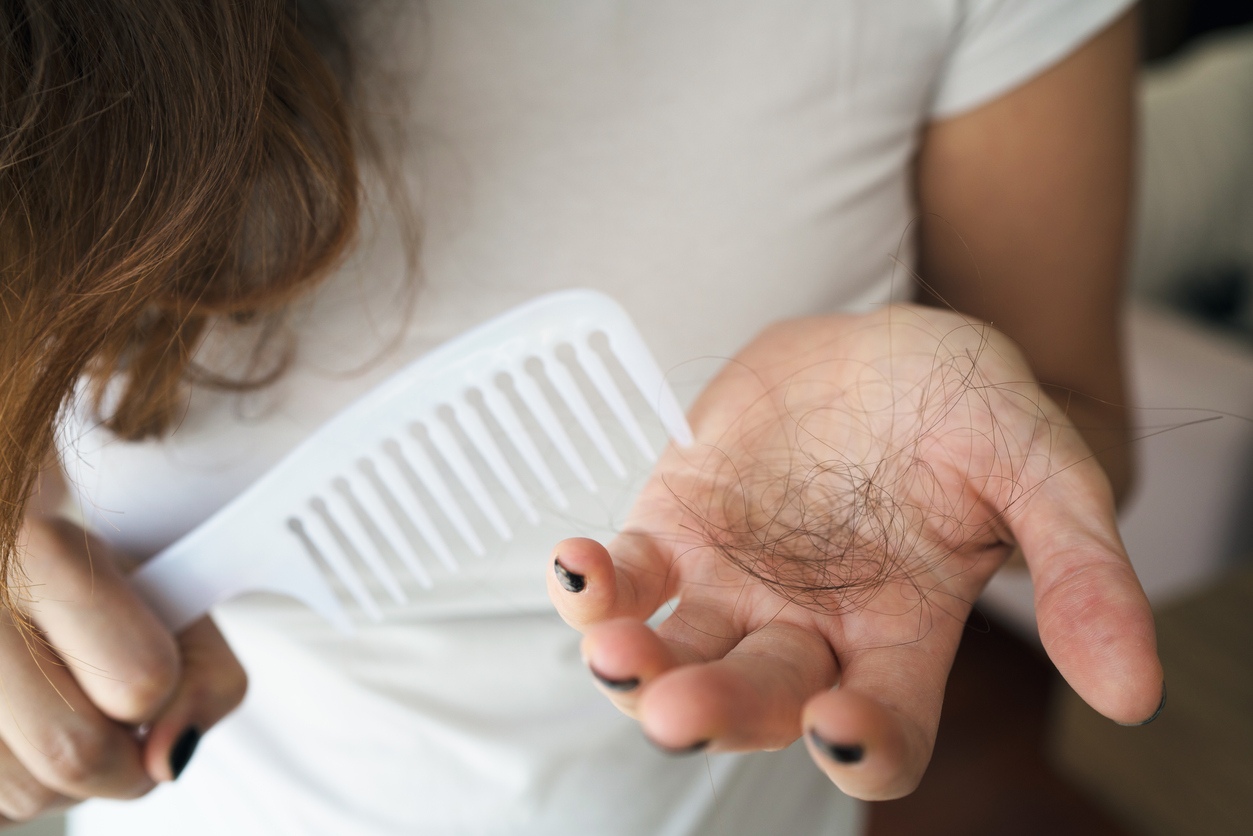We normally lose approximately 50 to 100 scalp hairs each day. If the hair fall is more than this, you may find unusually large amounts of hair in brushes, on clothing, and in the drains of sinks. You may also notice that your hair is generally thinner, that your hairline has changed or that one or more bald patches have appeared.
PCOS and hair loss
For some women with PCOS, hormonal imbalance, especially high levels of androgens can cause hair loss or thinning of scalp hair in a ‘male-like’ pattern, i.e. a receding frontal hairline and thinning on top of the scalp.
Androgenic alopecia is the thinning of hair caused due to elevated levels of androgens (male hormones). This androgen excess can also result in other symptoms of PCOS such as excess hair growth (hirsutism) in unwanted places such as face, chin, chest, and back.
Treatment for PCOS hair loss
Although there are a number of treatment options for PCOS hair loss that include topical treatments, oral medications, laser therapy or in some cases hair transplantation – these cannot completely cure hair loss but it can certainly make living with symptoms easier overall.
Minoxidil
Minoxidil is an over-the-counter topical treatment for hair loss. It is available as a liquid or a foam that is massaged into the scalp. It helps stimulate hair growth and reduce the incidence of hair loss. Although minoxidil is generally considered to be safe, some may experience dryness, itchiness or scaling of the scalp.
Spironolactone
Spironolactone is an anti-androgen drug that reduces androgen production and blocks androgen activity in the body. This can help reduce hair loss. It is commonly used in combination with birth control pills in women with PCOS, especially because it is contraindicated in pregnancy.
Finasteride
Finasteride works by preventing androgen from binding to receptors on hair follicles and thus reducing hair loss. However, it must be used with a hormonal contraceptive pill to avoid pregnancy.
Flutamide
Flutamide is a non steroidal anti-androgen drug that works by inhibiting the effect of excess androgen in the body. It is usually used in severe cases of hair loss and your liver profile in the blood needs to be carefully monitored while taking this drug.
In cases where topical or oral medications haven’t worked, some people also benefit from laser therapy and hair transplantation.
The drugs used for PCOS-related hair loss are potent and should be taken under the guidance and monitoring of a medical professional.
Role of lifestyle changes
Reversing PCOS by building sustainable lifestyle habits along with medications (in some cases) can help manage PCOS-related hair loss in the long term. These lifestyle changes take time to be a part of your life and that’s why consistency is an important part of your PCOS journey.
By lifestyle changes we mean, eating a healthy, balanced diet, staying active managing stress and getting good quality sleep. Since the root cause of PCOS hair loss is the underlying hormonal imbalance, treating the imbalance can help improve many symptoms of PCOS.
However, making lifestyle changes and staying consistent with it takes time. It can take anywhere from 9-12 months to see an improvement in your hair loss. When you manage your overall health with following a healthy lifestyle, you don’t need to rely on medications in the long run.
It’s important to remember that while androgenic alopecia or female pattern hair loss can be seen in women with PCOS who have high androgen levels but this type of hair loss is also pretty common in postmenopausal women—and their androgen levels are usually normal. Sometimes hair loss can also be a result of thyroid disorders, nutritional deficiencies or even stress related.
So it’s important to get to the root cause of your hair loss. If you’re concerned about hair loss, speak to a medical professional who can understand the reason and provide you with a treatment plan that addresses the root cause of symptoms of PCOS.
Disclaimer: Content on Veera is provided for informational purposes only and is not intended as medical advice, or as a substitute for medical advice given by a physician





















